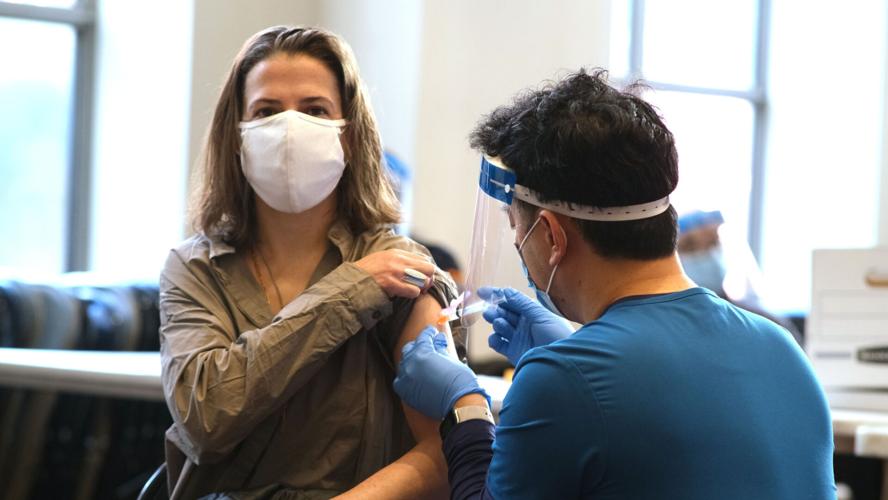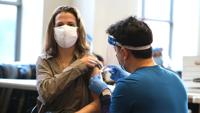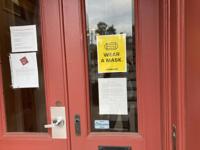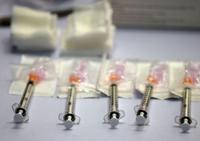Several local people said Wednesday they are eager to get an additional dose of the COVID-19 vaccine after federal officials announced a booster shot of the Pfizer-BioNTech and Moderna mRNA vaccines is needed to maximize protection against the coronavirus and prolong the inoculation’s durability.
COVID-19 vaccine booster shots are expected to become available to Americans by Sept. 20, according to a statement from the U.S. Department of Health and Human Services.
Shots will be available to fully vaccinated individuals eight months after their second dose, depending on the results of the U.S. Food and Drug Administration’s independent evaluation to determine the safety and effectiveness of a third dose of the Pfizer and Moderna mRNA vaccines and recommendations from the Centers for Disease Control and Prevention’s Advisory Committee on Immunization Practices, according to the department.
Supplemental doses are prioritized for elderly, immunocompromised and other vulnerable populations.
Pam French, of Hudson, tried to get the additional COVID vaccine dose Wednesday within hours of the announcement.
A pharmacist at a local CVS told her the booster dose was not available.
“We couldn’t get it yet,” said Will Ulmar, of Hudson, adding supplemental doses are reserved for high-risk people with underlying conditions or suppressed immune systems. “So at this point, we couldn’t get it. We have some health problems, but none of the ones where you can get the booster.”
Most COVID vaccine sites, including local health departments and pharmacies, have the free vaccine available to patients who walk in without an appointment.
French is concerned about the lambda COVID-19 variant recently discovered in Peru, and if it will supplant the prominently spreading delta variant that originated in India early this year.
“They were saying the vaccines don’t work against the lambda — that’s what I heard,” French said. “I thought that was kind of scary.”
Johnson & Johnson’s one-dose COVID vaccine was approved in February — nearly two months later than Pfizer and Moderna. More data on a booster shot for Johnson & Johnson’s inoculation are expected in the coming weeks, according to the U.S. Department of Health and Human Services.
Current data show that although vaccines are highly effective against the virus — including the delta variant — protection decreases over time, according to the department.
“I’m going to get it immediately — I’m 74, and I don’t want to die,” Sandy Van Alstyne, of Kinderhook, said Wednesday while visiting Main Street in Catskill.
Independent health experts on the state’s Clinical Advisory Task Force will review the FDA and CDC evaluations before making additional recommendations about a COVID-19 vaccine booster dose.
“When this FDA authorization and the ACIP recommendations are available, the department will complete this process quickly as it has in the past and act swiftly, as we have already been planning for this development,” state Health Department Commissioner Dr. Howard Zucker said in a statement Wednesday.
The state Health Department’s study examining new COVID cases and hospitalizations in adults by vaccination status, published by the CDC on Wednesday, shows the vaccine is highly effective against severe coronavirus infections and prevents hospitalizations caused by the virus.
Public health scientists and epidemiologists with the Health Department found vaccines remained about 92% to 95% effective at preventing hospitalizations among the vaccinated, according to the study.
The effectiveness of the vaccines declined from about 92% to 80% in reducing COVID-19 cases, but the high efficacy rate shows the use of vaccines remains a critical method in preventing virus infections and hospitalizations.
Researchers examined rates of cases and hospitalization among vaccinated New Yorkers ages 18 and older from breakthrough infections and compared them to rates among the unvaccinated from May 3 to July 25.
Some residents remain hesitant to get vaccinated against COVID-19.
Will Van Alstyne, of Chatham, is waiting for more research and medical data before getting the life-saving injection, citing risks and recalls with the first Gardasil vaccine to protect against human papillomavirus, or HPV.
“I probably won’t get it yet, maybe in a couple years,” Van Alstyne said Wednesday. “We don’t know much about it yet, so maybe when they know more.”
More than 12.6 million New Yorkers have received at least one COVID vaccine dose as of Wednesday afternoon, including at least 11.8 million New Yorkers ages 18 and older, or 77.8% of New York adults.
At least 70.1% of New Yorkers have completed the vaccine series, according to the CDC.
“The vaccines remain the best way for New Yorkers to protect themselves, their families and communities from COVID-19 and its most severe outcomes, and I continue to urge all eligible New Yorkers to get vaccinated as soon as possible,” Zucker said. “I thank the millions of New Yorkers who have already done so.”













